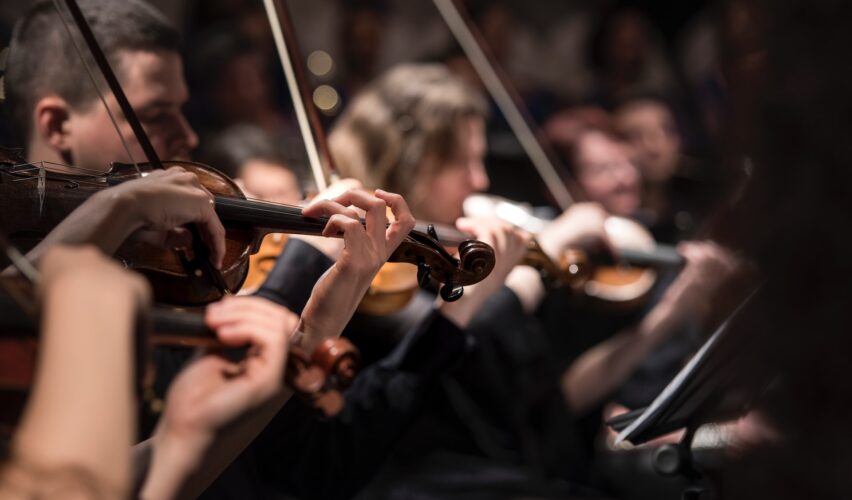Classical music is often seen as daunting or inaccessible to many people, but with a little bit of guidance and an open mind, anyone can learn to appreciate it. In this article, we will explore some tips on how to begin to appreciate classical music composers.
Understanding the History and Context
One of the best ways to appreciate classical music is to understand the history and context of the music. Learning about the composer’s life and the time period in which they lived can provide valuable insight into the meaning and emotion behind their music.
For example, Beethoven’s Symphony No. 9 is widely regarded as one of his greatest works, but understanding the context in which it was written can deepen your appreciation for the piece. The symphony was written during a time of political upheaval in Europe and reflects Beethoven’s belief in the power of unity and brotherhood.
Similarly, understanding the Baroque period, which spanned from 1600-1750, can help you appreciate the complexity and ornamental qualities of the music. The music of Bach, Handel, and Vivaldi, among others, showcases the technical mastery and attention to detail that characterized this era.
Listen with Intent
When listening to classical music, it’s important to listen with intent. Rather than treating it as background noise, actively engage with the music and try to identify different elements of the composition. Pay attention to the melody, harmony, rhythm, and timbre of the instruments.
You can also listen for recurring themes or motifs within the music. For example, in Mozart’s Symphony No. 40, the opening melody is repeated throughout the entire piece, creating a sense of unity and coherence.
Listening with intent can also help you appreciate the subtleties of the music. For example, in Chopin’s Prelude in E minor, the delicate phrasing and dynamic contrasts create a haunting and melancholic mood.
Start with Familiar Composers
If you’re new to classical music, starting with familiar composers can be a great way to ease into the genre. Composers like Mozart, Beethoven, and Bach are household names, and their works have been popularized in movies, commercials, and television shows.
You can also explore popular classical music playlists on streaming platforms like Spotify or Apple Music. These playlists often feature recognizable pieces by well-known composers.
However, don’t be afraid to venture outside of your comfort zone and explore lesser-known composers as well. There are many underrated composers whose works are just as deserving of attention and appreciation as those of the more well-known names.
Attending Live Performances
Attending a live classical music performance can be a transformative experience. Seeing the musicians perform in person and feeling the vibrations of the instruments can create a deeper connection to the music.
Many cities have symphony orchestras or chamber music ensembles that offer affordable tickets for students and young adults. You can also look for free outdoor concerts or community performances in your area.
Attending a live performance also provides the opportunity to witness the interpretation and artistry of the performers. Each musician brings their own unique style and interpretation to a piece, making each performance a one-of-a-kind experience.
Explore Different Genres
Classical music encompasses a wide range of genres and styles, from Baroque to Romantic to Contemporary. Exploring different genres can help you discover new composers and pieces that you may not have otherwise encountered.
For example, if you enjoy the dramatic and emotional qualities of Romantic music, you may also appreciate the works of composers like Tchaikovsky or Chopin. Or if you prefer the clarity and structure of Baroque music, you may enjoy the works of Bach or Handel.
Exploring different genres can also help you appreciate the evolution of classical music over time. For example, listening to music from different periods can help you understand how the style and techniques of composers evolved over time.
Read About the Music
Reading about the music and the composers can also deepen your appreciation for classical music. There are many great books, biographies, and essays about classical music that can provide valuable insights into the composers and their works.
For example, reading about the life of Beethoven and his struggles with deafness can provide a deeper understanding of the emotion and intensity in his music. Similarly, learning about the unconventional life of Erik Satie can shed light on the eccentricities in his compositions.
There are also many online resources that provide valuable information about classical music, including music history, theory, and analysis. Websites like AllMusic or The Classical Net offer detailed information about composers, their works, and recommended recordings.
Find a Community
Finding a community of fellow classical music enthusiasts can provide a supportive environment for exploring and appreciating classical music. There are many online forums and social media groups dedicated to classical music, as well as local meetups and events.
Attending live performances and interacting with other audience members can also provide an opportunity to connect with like-minded individuals who share your passion for classical music.
Conclusion
In conclusion, learning to appreciate classical music composers takes time and effort, but it can be a rewarding and enriching experience. By understanding the history and context of the music, listening with intent, exploring different genres, attending live performances, and finding a community of fellow enthusiasts, anyone can develop a deep appreciation for classical music.
Remember, there is no right or wrong way to enjoy classical music. Each listener brings their own unique perspective and interpretation to the music, and what resonates with one person may not resonate with another. The key is to keep an open mind and approach the music with curiosity and a willingness to explore.


